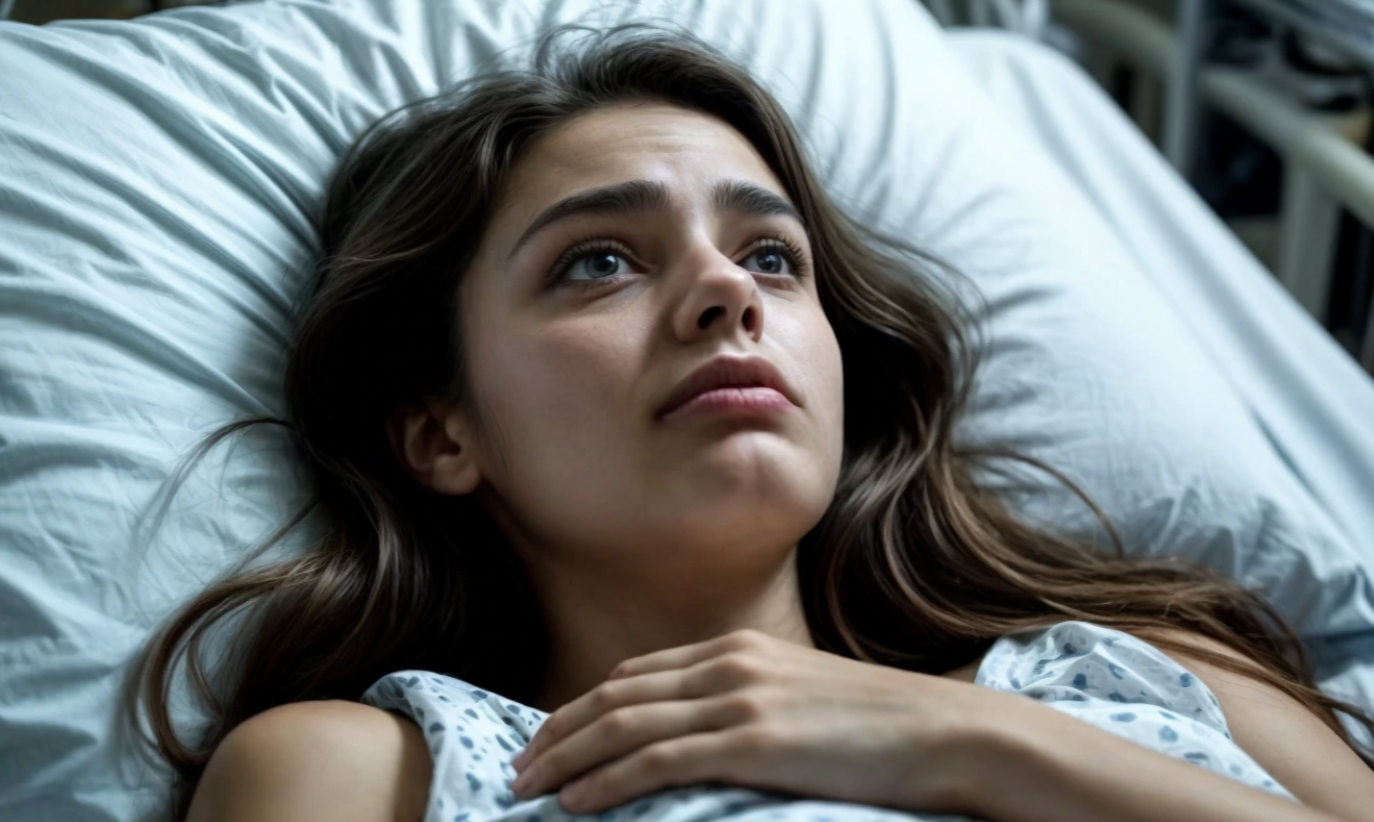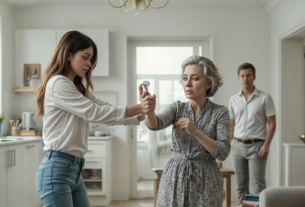Nadia regained consciousness in the intensive care unit and realized that her life would never be the same again. She heard the words spoken by her husband.
The snow-white walls, the monotonous beep of the machines, the sharp smell of antiseptic—everything overwhelmed her as she started coming to. Her head buzzed, her body felt foreign, and tubes and wires were everywhere. Struggling to open her eyes, Nadia immediately squinted— the light was too bright, too piercing. Her attempt to speak ended in a weak rasp.
There were two people in the room: the doctor in a wrinkled coat and her husband, Leonid. They were standing by the window, speaking to each other in a half-whisper, thinking she was still unconscious.
“You need to be prepared for the fact that recovery will take a long time,” the doctor said. “After such an injury, neurological impairments may…”
“I don’t care about neurology,” Leonid abruptly cut him off. “I just want to know when she’ll be able to take care of herself. I have work, I can’t waste time on hospitals and caregivers.”
At these words, Nadia’s heart froze, and the cardiomonitor reacted with an increased beep.
“You see,” the doctor continued, “we can’t say for sure yet which functions have been affected. Rehabilitation may take months, or even years.”
“Years?” Leonid grimaced. “We don’t have either money or time for that.”
“How about insurance?”
“It only covers basic treatment. Private clinics and specialized rehabilitation will be at our expense.”
Nadia closed her eyes, hoping no one would notice she was awake. Twenty years of marriage. Ten of those years, she had dedicated to supporting his career, abandoning her own. And now, this is how it turned out.
“What I mean is…” Leonid’s voice became quieter, but she could still hear every word. “We haven’t been getting along for a while. Maybe this is a sign.”
“Excuse me?” the doctor was surprised.
“A sign that it’s time to move on.”
Footsteps approached. Nadia felt the doctor’s gaze on her.
“Your wife is conscious,” he said calmly.
Leonid walked up to the bed. Nadia slowly opened her eyes and met his gaze. For a moment, something flashed in his eyes—fear? Shame?—but it quickly shifted to the usual mask of confidence.
“Nadia, you’re awake!” he took her hand, but she weakly pulled her palm away.
“I heard everything,” she rasped, her voice barely recognizable. “Every word.”
Leonid turned pale.
“You don’t understand, I’m just stressed, I didn’t…”
“Leave,” she whispered.
“We need to talk, you’re not in a state…”
“Leave!”
The doctor placed a hand on Leonid’s shoulder.
“I think she needs rest now. You can visit her later.”
When the door closed behind her husband, Nadia closed her eyes. Silent tears ran down her cheeks.
“I’m sorry,” the doctor said softly, checking the monitor. “Truly sorry.”
“Don’t,” Nadia exhaled with difficulty. “What happened to me?”
“You were in an accident. A serious pelvic fracture, moderate brain injury, internal organ damage. We fought for your life for three days.”
“Will… will I be able to walk?”
“Yes, but it will require long rehabilitation. If you’re a strong woman—and judging by your reaction, you are—you’ll make it.”
In the corridor, Leonid sat with his face buried in his hands. Beside him was Marina, Nadia’s younger sister, who had flown in from St. Petersburg as soon as she heard the news.
“She hates me,” he mumbled.
“And rightly so,” Marina replied coldly. “For twenty years, she stood by your side, supported you, and now, when she needs help…”
“You don’t understand. We’ve been… it was a marriage of convenience.”
“And that gives you the right to abandon her in her time of need?”
Leonid lifted his head. His eyes were filled with tears.
“I was just scared. I don’t know how to handle all this.”
“And she, do you think she’s ready?” Marina shook her head. “Pack your things. I’m moving in with her. Neither of you is in the state to make decisions about the future.”
The next two months for Nadia were filled with pain, procedures, and exercises. Each day started the same: Marina helped her wash, dress, and eat. Then came doctors, nurses, and physiotherapists. Endless injections, IVs, massages, and attempts to get out of bed.
Leonid never showed up again. Nadia learned from Marina that he had rented an apartment and took only the essentials. Once a week, he transferred money into an account Marina had opened for her treatment. No notes, no phone calls.
“I don’t understand what happened to him,” Marina said while helping Nadia with hand exercises. “He always seemed so reliable.”
“He was reliable,” Nadia replied, wincing from the pain. “As long as I was useful.”
“You’re too cynical,” Marina remarked.
“I’m a realist,” Nadia said. “For twenty years, I believed we were a team. Turns out I was just a convenient part of his life. A part broke—so it was discarded.”
Marina hugged her sister’s shoulders.
“You’re not an object. You’re a person. And you deserve more.”
That night, after Marina left for home, Nadia stared out the window. The city lights blurred through her tears. Twenty years of shared life, common plans, friends, memories—all shattered in a few minutes due to an overheard conversation.
The phone vibrated. The first message from Leonid in two months:
“We need to talk. I’ll come tomorrow.”
Nadia didn’t reply. She turned off her phone and for the first time in a long while, fell asleep without sleeping pills.
The next morning, there was a knock at the door. Leonid stood at the threshold with a bouquet of white lilies—her favorite flowers. He looked unwell: haggard, with dark circles under his eyes, in a wrinkled shirt.
“Hi,” he said uncertainly. “Can I come in?”
Nadia nodded. By now, she could sit on her own, comfortably in a chair by the window. Leonid placed the flowers in a vase and sat opposite her.
“You look better,” he began.
“You look worse,” she shot back.
He smiled weakly.
“Deserved it. Nadia, I came to apologize. What I said back then… it was awful.”
“It was the truth. Just not meant for my ears.”
“No,” he shook his head. “It was fear. When I saw you in the hospital, all hooked up to machines, I froze. I was afraid you wouldn’t wake up, that everything would change, that we…”
“And the first thought was—how to get rid of the problem as quickly as possible?” she finished for him.
“The first thought was—I’m not going to make it. I’m weak, Nadia. I always have been. You were strong for both of us.”
Nadia stared at him, not looking away. In the two months, she’d thought a lot about their marriage, analyzing all twenty years. With bitterness, she admitted: Leonid was right. It really had been a marriage of convenience. Without passion, but also without serious conflicts. She had supported his career, and he provided comfort. But there was no love anymore.
“You know,” she said finally, “maybe it was a sign.”
“A sign?” he was surprised.
“A sign that it’s time to move on. That’s what you said, right?”
“I didn’t mean that…”
“What did you mean, Leonid? Now that I can sit and will soon be walking, have you changed your mind? Am I becoming convenient again?”
“I meant I made a mistake. I panicked, said things I didn’t mean.”
“You meant it,” Nadia said firmly. “Maybe you didn’t realize it, but you meant it. And you know what? You were right. We really do need to move on. Separately.”
Leonid looked at her with pain and disbelief.
“You want a divorce?”
“I want to live for myself. For the first time in twenty years. This accident gave me a push. It showed me that life can end at any moment, and we need to spend it on what truly matters.”
“And I’m not important?”
Nadia smiled sadly.
“We stopped being important to each other a long time ago, Leonid. We just were too afraid to admit it.”
By spring, Nadia had learned to walk with a cane. She was transferred to a rehabilitation center with a pool, exercise equipment, and specialists. Leonid paid the bills regularly and sometimes visited her, but a polite distance remained between them.
The divorce was finalized without scandals. They sold the apartment and split the money evenly. Nadia found a small studio near the city center. Marina helped with the move.
“Are you sure you’ll manage on your own?” her sister asked, putting dishes in the cabinets.
“No,” Nadia answered honestly. “But I want to try.”
The first weeks of independent life were tough. Cooking, cleaning, even going to the store became a real marathon. But gradually, Nadia adapted. She developed her routes, her rhythm, her ways of dealing with daily tasks.
And then, the internet appeared in her life. Not just as a way to entertain, but as a tool. She started looking up information about her injury, rehabilitation methods, and other people’s stories. She joined forums and support groups. One day, she came across online courses in web design—an old hobby she had abandoned after marriage. And unexpectedly, she became passionate about it.
“You have a clear talent,” said the course instructor after she finished her final project. “If you’d like, I can recommend you to a few clients for freelance work.”
Nadia agreed, though she didn’t fully believe in her success. But her first job creating a website for a local coffee shop went smoothly. Then came the second, the third… And so, a new life began.
A year after the accident, Nadia sat at a table in that same coffee shop where she had worked on her first project. A cup of cappuccino sat before her, and her laptop was open to a page with new orders. The cane rested nearby—it now served more as a precaution than a necessity.
“Nadia?”
She looked up and saw a tall man with a neat beard and a thoughtful expression.
“Sorry, do we know each other?”
“Oleg Sergeyevich,” he extended his hand. “I was your doctor after the accident. Don’t you remember?”
Nadia squinted. A vague memory of a person in a white coat talking to Leonid by the hospital room window surfaced.
“Of course,” she smiled. “Please, sit down.”
Oleg sat down opposite her.
“You look amazing. Honestly, I barely recognized you.”
“The last time you saw me, I was lying in a hospital bed, barely alive. So any change is progress.”
“It’s not just about how you look,” Oleg shook his head. “There’s a confidence in you now. An inner strength.”
Nadia thought for a moment. The last year had truly changed her. She had learned to rely only on herself, to make decisions, and to build her life on her own terms. From a quiet, silent wife, she had become an independent woman with goals and plans.
“You know,” she said finally, “sometimes the scariest events can be a springboard to a better life. I never thought I’d say this, but that accident… it saved me.”
“From what?” Oleg asked.
“From a life that wasn’t mine. From a relationship that had long run its course. From the fear of changing anything.”
Oleg looked at her with unhidden admiration.
“I meet a lot of patients after severe injuries, but I rarely see such a transformation.”
“It’s just the survival instinct,” Nadia smiled. “When the world collapses, you can either fall with it or start building a new one.”
They talked until the coffee shop closed. Oleg shared that he had recently moved from the city hospital to a private clinic, where he worked with patients recovering from complex injuries. Nadia shared her progress in web design and her dream of opening her own studio.
“Maybe we should collaborate,” Oleg suggested. “Our clinic could really use a new website.”
“Or maybe we should just have dinner together,” Nadia answered unexpectedly, even to herself.
Oleg smiled.
“That would be wonderful.”
As they left the coffee shop, Nadia noticed Leonid across the street. He was standing by a store window with a young woman, holding her hand. When he saw Nadia, he froze for a moment, then waved awkwardly.
Nadia returned the wave, then, leaning on her cane, walked on. Oleg walked beside her, his hand gently resting on her elbow. The world around her no longer seemed the same—it had become far more interesting.
In that moment, she realized: the accident hadn’t broken her life; it had given her a second chance. A chance to hear the truth, no matter how bitter. A chance to find the strength for change. A chance to start over.
And she was grateful to fate for that chance.


